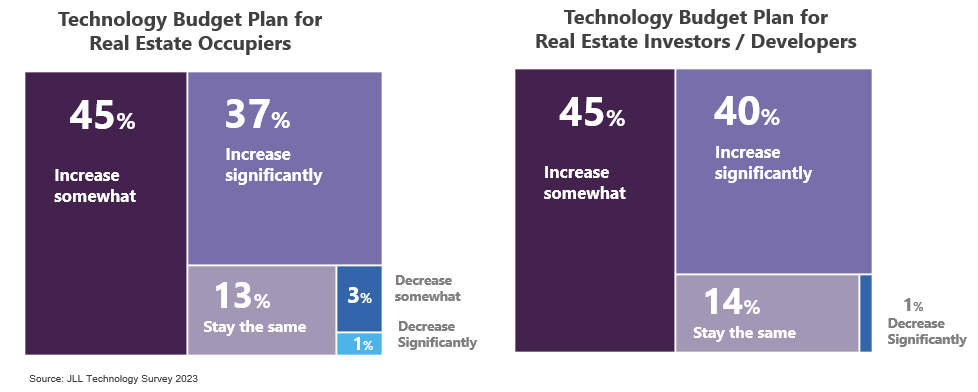Overview
Real estate, the largest asset class in the world, with a projected value of $613.60 trillion in 2023, spans several segments such as properties, construction, estate agencies, sustainability, and consulting. Digital disruptions in this industry are most likely to manifest in the way industry players use, build, and buy / sell real estate assets.
Buying or selling real estate is usually a data-driven investment decision that is strongly influenced by the cost of capital. Generative AI (GenAI) has the potential to drive better investment decisions in this space by enhancing data collection and analysis. However, so far, its integration has not yielded the expected results.
For instance, Zillow, an online marketplace, used complex algorithms to trade US residential properties; however, it did not work out as expected, and its share price slipped by ~80% from the peak. In this regard, The Guardian stated, “The biggest issue is that its algorithm simply was not up to snuff. It could not deal with the complexities of pricing in a volatile market and resulted in Zillow overpaying for a lot of property.”
GenAI is currently being used to streamline internal process in Real Estate
Players in the real estate industry are currently focusing on implementing GenAI solutions to streamline their internal processes (e.g., facilities management, rent collections, marketing, general corporate overheads, and enterprise function optimization). However, there are few use cases that showcases GenAI can be used to improve revenue opportunities for real estate players. For instance,
- GenAI could combine CRM and marketplace data, including relationship data, social information, and listing activity of a property, to make predictions that can enable agents to effectively identify appraisal leads.
- It could benefit hotels and similar properties by facilitating efficient revenue management and predictive maintenance. For instance, GenAI models can analyze vast amounts of data, including historical booking patterns, market trends, and other relevant factors, to generate accurate demand forecasts which means additional revenue for industry.
- GenAI solutions could also enhance construction design processes, as well as enable real estate firms to provide customizable and virtual property tours to potential clients, which in turn could increase their property monetization opportunities.
Below table illustrates the adoption of Generative Artificial Intelligence (GenAI) by various real estate industry stakeholders. However, the data suggests that most of these use cases are primarily focused on optimizing internal operational processes rather than generating external-facing revenue opportunities.
|
Company
|
GenAI Initiatives
|
Category
|
|---|---|---|
|
Compass
|
• Generating engaging property descriptions and listing narratives using GenAI models
• Creating virtual tours and 3D visualizations of properties |
Virtual Tour
|
|
Zillow
|
• Developing GenAI-powered chatbots and virtual assistants for customer support and inquiries
• Generating virtual tours and 3D walkthroughs of properties |
Chatbots and Virtual tour
|
|
Redfin
|
• Using GenAI for targeted marketing campaigns, social media content, and email outreach
• Generating property descriptions and listings tailored to specific buyer personas |
Marketing
|
|
Cushman & Wakefield
|
• Partnering with technology companies to develop GenAI solutions for property marketing and client engagement
• Generating personalized marketing materials and targeted outreach campaigns |
Marketing
|
|
Century 21
|
• Implementing GenAI-powered virtual assistants to support agents and clients throughout the buying/selling process
|
Chatbots
|
|
Opendoor
|
• Uses GenAI for guessing future home prices, and then strategize to buy homes at good prices currently for selling later at a margin
|
Predictive Analytics for pricing
|
~ 80% of real estate companies are increasing their technology budgets to integrate GenAI solutions: While GenAI has already made a significant impact in the world of real estate, its journey has just started. As GenAI tools become more sophisticated and accurate, their integration into broader real estate processes could yield unlimited possibilities.
- The industry has already witnessed major GenAI integrations by leading CREs. For instance, CBRE has launched a multi-LLM and self-service GenAI platform that uses natural language processing to enable people to interact with various data classes.
- Furthermore, JLL has unveiled JLLGPT, its proprietary GenAI platform, to simplify business processes, increase productivity, and accelerate results for real estate clients.
However, it would be interesting to see how businesses shed their legacy processes, embrace technology, and use GenAI tools to reshape tenant-landlord dynamics to foster an environment where informed decision-making becomes the norm.
As per a JLL survey in 2023, more than 80% of real estate companies are increasing their technology budgets to integrate GenAI solutions in their building and real estate construction and development operations. The survey highlights that GenAI has certainly made inroads into conversations and subsequent actions of C-suite executives of real estate companies.
The availability of technology that can move beyond traditional use cases, such as producing a rent forecast or a retention prediction for tenants (which was also possible with the old machine-learning models), has forced the usually technology-laggard real estate companies to adopt GenAI much quicker than technologies before it.

Gen AI could generate $100-180 billion or more in value for the real estate: As per a survey by McKinsey, Gen AI could generate $100-180 billion or more in value for the real estate industry. It is not an alternative to analytical AI; instead, its depth and creative nature bring to the fore those use cases that analytical AI cannot address.
To unlock 's (GenAI’s) immense potential in the real estate realm, firms must adopt a comprehensive approach. They must evaluate their core functions - development, operations, investments - and contemplate how GenAI could revolutionize the experiences of tenants, employees, and other stakeholders. Subsequently, companies should restructure roles, responsibilities, and organizational structures to align seamlessly with GenAI's transformative capabilities.
Explore and identify use cases/opportunities where C-suite of real estate companies can commit a reasonable budget to start making inroads into infinite opportunities presented by GenAI.
Building Operations
- By providing data-driven insights and solutions for energy management, GenAI has the potential to further strengthen energy management
- Security and access control can be further enhanced
- Chatbots for tenants will become commonplace, enhancing the efficiency of tasks like maintenance requests, account information, and rent collection
- Marketing and leasing processes can be significantly enhanced
Due Diligence
- GenAI solutions can analyze vast amounts of data, including historical sales, property features, and market trends to generate accurate evaluations
- The process of conducting due diligence can become less burdensome and more dependable, yielding crucial information that either validates the decision to proceed or uncovers issues that impede a deal
- GenAI can also enhance portfolio planning, scenario planning, contracting and financial analysis
Enterprise Functions
- HR, IT and legal are typical support functions within real estate, and GenAI can streamline them to a significant extent
- Employee chatbots can streamline HR processes such as recruiting
- AI can be used to develop and deploy code for new capabilities and to manage cybersecurity
- Legal functions, such as contracting and document automation, can be revolutionized
Asset Management
- GenAI can equip asset managers with requisite tools to collect and analyze property-level data more effectively
- Additionally, leasing, ESG reporting, capital planning, and risk detection could all benefit from the application of GenAI
- Enhancing forecasting and budgeting, as well as expediting reporting and scenario planning, are all possible with GenAI
Finance
- With the use of GenAI, the creation of financial predictions and reports, risk assessment and compliance, and fraud detection can all be expedited
- Automation has been used to some degree in tasks like invoicing, payments, and invoice production and processing, but AI can improve these processes even more
Common challenge in implementing generative AI in the real estate industry and their resolutions
Diverse and representative training data: GenAI models require high-quality real estate industry data to ensure accurate and reliable performance. However, real-world data often contains missing or erroneous values that can degrade the performance of a model and lead to misguided decision-making.
- Challenges such as insufficient data or inconsistency can hinder data consolidation and adversely affect model performance. The quality, completeness, and consistency of data can be enhanced thorough pre-processing, validation, and augmentation. For instance, a chatbot can be trained on a building’s past maintenance requests so that it can efficiently respond to tenants’ complaints.
- Moreover, synthetic data can help overcome some data limitations, while maintaining privacy. For instance, GenAI model which requires access to a wide range of real estate data, including recent sales prices, property characteristics, and market trends can be trained with proprietary as well as synthetic data.
Legal Compliance: Real estate companies often collect sensitive information, and the integration of AI necessitates stringent data protection measures to prevent breaches. For instance, in lease generation, generative AI can automate the creation of lease agreements based on predefined templates and specific terms.
- However, legal professionals must review and validate the AI-generated leases to ensure compliance with local laws and regulations. Addressing unique circumstances or exceptions is crucial to avoid legal pitfalls.
Organizational Culture and Readiness: Successful adoption of generative AI depends on the organization’s culture and readiness. Real estate firms should develop a considered roadmap with clear goals and milestones.
- By leveraging GenAI algorithms, firms can analyze customer preferences, historical data, and market trends to provide personalized property recommendations. Setting measurable goals helps evaluate the effectiveness of these systems in improving customer satisfaction and conversion rates.
Balancing Technology and Human Involvement: Implementing generative AI requires striking a balance between technology and human involvement. While AI automates processes, human oversight remains critical. Addressing the limitations of GenAI models and ensuring alignment with business goals are essential for transformative outcomes.
- For example, real estate companies can use GenAI-powered virtual reality technology for immersive virtual property tours. By embedding generative AI firms can enhance customer experience, however an in-person broker would always be required to conclude the leasing deal.
End thoughts
GenAI that will be available for real estate industry involve ‘knowledge work’. Computers can process information at infinitely faster speeds and at greater volumes than human intelligence, so artificial intelligence can be a very powerful tool for knowledge workers like real estate agents.
Real estate firms spanning the entire value chain that proactively adopt early proof-of-concept initiatives and begin aligning their technology infrastructure to facilitate future use cases will gain a significant competitive advantage. Prudent steps include dedicating resources to thoughtfully integrate vendor systems and establish robust data connectivity across property management platforms, customer relationship management solutions, and maintenance portals.
It's vital to say that trust in GenAI is crucial – biases can arise not only from data but also from system design and developers’ assumptions. To mitigate such bias, it is pertinent to use diverse data sources such as first-party data in the CRM of real estate companies, licensed data, and publicly available data, along with model creators from varied backgrounds.
In conclusion, the strategic groundwork laid by forward-thinking organizations will help them to optimally capitalize on the transformative potential of emerging technologies. There is no second thought that real estate industry is changing and GenAI holds incredible potential as a tool for it beyond conversational bots and automating data extraction.
How Evalueserve can help
We’re Evalueserve, the leading technology-enhanced managed services provider. Our insights and analytics solutions optimize your workflows, accelerate decisions, and scale business impact. We support our clients in achieving maximum impact by turning information and insights into decisions with dynamic AI/GenAI-driven products and solutions delivered by our 5,000+ domain experts. Evalueserve offer a wide range of knowledge services to their clients, leveraging their expertise and industry experience.
ESG Solutions: Evalueserve support businesses with the following services:
- Opportunity identification & Market Assessment
- Identify the potential opportunities and sectors
- Uncover geography-specific risks and opportunities on the adoption of smart building technologies
- Analyze the business of prospective clients to ascertain the specific decarbonization needs
- Identify suitable partnership and distribution models for market entry
- Regulatory Assessment & Due Diligence
- Track of country-specific sustainability regulations and associated changes on real-time basis
- Analyze the ‘Net-Zero GHG Emissions Targets’ of different countries
- Cross-country assessment of energy codes, building standards, building certifications, etc.
- Intelligence on ‘Scope 1 to 3’ emissions reporting and rising focus on supply chain decarbonization
Product Intelligence: Evalueserve empowers businesses with the following services:
- Comprehensive product benchmarking to gain a competitive edge
- In-depth analyses and insights to strengthen the value proposition of existing product portfolios
- Vendor assessment spanning:
- Traditional real estate firms
- Agile start-ups
- Large-scale technology enterprises
Investment Strategy: Evalueserve provide support in conducting extensive research and analysis on various topics:
- Portfolio strategy
- Portfolio monitoring
- Industry/macroeconomic overview
- Industry/company/property newsletters
- Deal runs/summaries
REITs Analytics: Evalueserve offers specialized analytics services to support REITs in their operations and decision-making processes:
- Financial modelling
- REITs forecasting
- Geographic assessment
- REITs subsector Analysis
- REITs submarket Analysis
Insightsfirst Competitive Intelligence (CI) – An AI-driven proprietary platform
- Competitive market watch, powered by AI / NLP engines
- Thought leadership and publication tracking, using scraping and text analytics
- Identify actionable insights and trends to make informed and prompt decisions
Talk to One of Our Experts
Get in touch today to find out about how Evalueserve can help you improve your processes, making you better, faster and more efficient.


